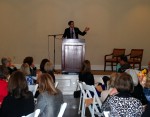Sorkin Discusses Economy at WPH Auxiliary Luncheon

Speaking at the Brae Burn Country Club in Purchase last week, financial writer Andrew Ross Sorkin asked the crowd at the White Plains Hospital 2012 Auxiliary Luncheon to think back to September 15, 2008. Lehman Brothers had just filed for bankruptcy, and Americans had no idea what their country’s financial system would look like in the coming weeks and years.
“I’m not sure we truly understood where we were going and how bad it really was,” said Sorkin, a New York Times columnist and the author of the 2009 bestseller “Too Big to Fail.” “It’s worth recognizing how far, frankly, we’ve come.”
Sorkin, a Westchester native, was the keynote speaker at Wednesday’s luncheon. The hospital is looking to raise $100 million in philanthropic contributions as part of its “The Time is Now” campaign.
“In 2011, the hospital had the busiest year in our history,” White Plains Hospital CEO Jon Schandler said in his introductory remarks. “We do everything we can to make sure we’re successful in this ever-changing healthcare system.”
Sorkin, who acknowledged he had been a patient at the hospital as a kid, said his grandfather spent his last years at WPH.
“He was a great beneficiary of being cared for by some wonderful people,” Sorkin said.
Mostly, though, Sorkin talked about his area of expertise, the economy. Having interviewed hundreds of the key players in the 2008 financial crisis, Sorkin had unique insight into what went wrong three-and-a-half years ago – and as importantly, what didn’t.
“Had the government not taken some of the steps that it did, and I know those steps are controversial and we’ll talk about them, but had some of these steps not been taken that week it was clear that Morgan Stanley was going to file for bankruptcy by the end of the week, no question,” he said. “If Morgan Stanley filed for bankruptcy, no question Goldman Sachs was going to file for bankruptcy the next week.”
The next domino, he continued, would have been General Electric.
“Think about, for a moment, what the bankruptcy of GE, a global conglomerate with 287,000 employees throughout the world, what that means,” Sorkin said. “GE is [General Motors] times 10, if not more so, and the ripple effect, I would argue to you, would have put us in a place that I don’t think we could have ever imagined.”
Though initially not a supporter, Sorkin said he eventually accepted that the Troubled Asset Relief Program – the government bailout – was necessary to prevent unemployment from rising to possibly triple the rate it is now.
Sorkin said he believes Wall Street has changed somewhat since the financial crisis.
“The banks today have much higher capital requirements than ever before, which means the banks have a much higher rainy day fund than they ever did,” he said, crediting the Federal Reserve for raising the requirements. “And that’s very good news, but it’s having a more profound effect than you’d imagine.”
Acknowledging on several occasions that his views may be unpopular, Sorkin pushed back on some of the narratives that have emerged in recent years. He discussed what kind of an effect executive compensation had on the mindset of the people at the top (not much, in his opinion), and said that although the crisis “feels like a crime,” there weren’t grounds to bring criminal charges against the people at the top of the major financial organizations (though he was surprised the SEC hasn’t brought civil charges). He dismissed the sentiment that bankers made risky bets knowing, if worst came to worst, that the government would bail them out.
“I interviewed people who hated these individuals, people who loved these individuals,” he said, referring to the bankers who made some of the bad bets in the middle of the last decade. “I never found one person who said, ‘I remember being in a meeting where some executive said: You know what? Throw caution to the wind. Let’s shoot the moon and go for gold. And if we fail and fail miserably, we’re going to be saved.’ It just didn’t happen.”
Calling the United States “the ultimate ADD nation,” Sorkin urged patience on economic matters and challenged the crowd to take some personal responsibility for the fate of the country’s economic future.
“Through this whole financial crisis, we’ve spent a lot of time blaming a lot of people,” Sorkin said. “Rarely, if ever, does anybody say, ‘Maybe it was my fault.'”
For more information on the hospital, visit www.wphospital.org.

Adam has worked in the local news industry for the past two decades in Westchester County and the broader Hudson Valley. Read more from Adam’s author bio here.

